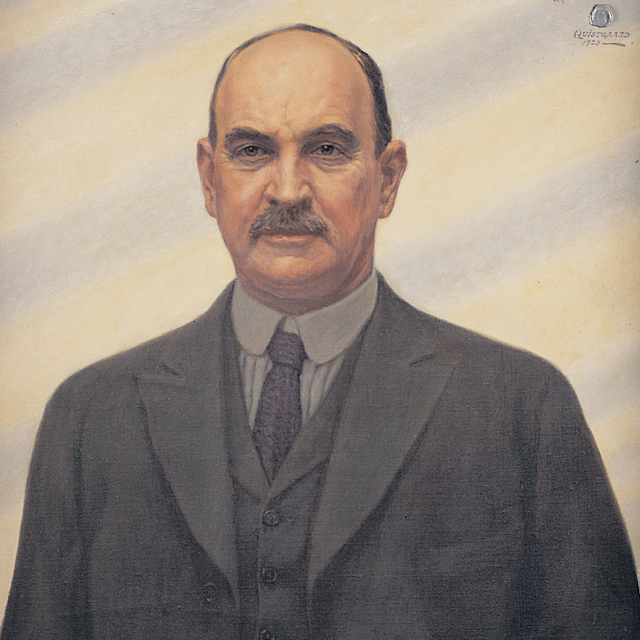David F. Houston, a political scientist who served in the cabinet of U.S. President Woodrow Wilson after his chancellorship at Washington University in St. Louis, was born in Monroe, North Carolina, in 1866.
After graduating from South Carolina College (now the University of South Carolina) in 1887 with a degree in classics, he accepted a tutorship at the college and taught Greek and Latin while pursuing graduate studies in history and economics.
He left the college after one year to become superintendent of the Spartanburg, South Carolina, city schools. Following three years as superintendent, he began graduate work at Harvard on a Morgan Fellowship, specializing in history, economics and government. He earned his master’s degree from Harvard and while there made his first contribution to political literature by helping write a textbook issued by the Democratic National Committee. He went on to become a faculty member at the University of Texas, where he eventually became a full professor of political science, head of the School of Political Science and dean of the faculties.
No great university can be built up and sustained unless the university can secure and keep a fair number of the strongest, greatest, most creative and inspiring of the world’s teachers and investigators…In addition to these things there must be a mature university student body, considerable leisure on the part of professors for research, a sympathetic environment, and absolute freedom in subject and method.
David F. Houston, “A University for the Southwest,” address to the Commercial Club of St. Louis, October 30, 1908
In 1902 he was named president of the Agricultural and Mechanical College of Texas but left after three years to return to the University of Texas as president. He became chancellor of Washington University in 1908 at the young age of 42 and immediately became involved in state and national politics, helping to amend the state constitution to foster rural education.
Robert S. Brookings described him to board member Adolphus Busch as “the great Chancellor whom you always have been talking about.” He was a quiet, brilliant, self-effacing man, and one magazine described him as being able to “keep silent in seven languages.”
He was a great proponent of extracurricular student life, and by the end of his tenure there were 60 student groups on campus, as well as a new student government. He strengthened academic life as well, adding to the library collections, enhancing graduate education, establishing architecture as a separate school, and bringing out to the Hilltop Campus those divisions still located in downtown St. Louis, including the law and art schools. The medical school was also greatly strengthened and expanded, and it was during his chancellorship that it partnered with Children’s and Barnes hospitals.
He was among the first to advocate for Woodrow Wilson’s nomination for president, and during the 1912 presidential campaign, he served as one of Wilson’s confidential advisers. Shortly after Wilson’s election he took a leave of absence from the university to serve as U.S. Secretary of Agriculture.
He took final leave of the chancellorship in 1917 in order to remain in Washington, D.C., and he later became Secretary of the Treasury. He retired from that office in 1921 and moved to New York. He died in 1940.
Notable dates
1908: David F. Houston, president of the University of Texas, became chancellor, replacing Marshall Snow, who had served as acting chancellor since Chancellor Chaplin’s retirement in 1907.
1908: On October 31, Chancellor Houston outlined his vision for Washington University in a talk before the Commercial Club titled “A University for the Southwest.”
1910: Abraham Flexner’s report, Medical Education in the United States and Canada, found Washington University’s Medical Department “inadequate in every essential respect.”
1910: Architecture, which had been a department within the School of Engineering, became a separate school.
1911: The university forged agreements linking the medical school and its faculty with Children’s Hospital and Barnes Hospital.
1913: Chancellor Houston took a leave of absence from the university to serve as U.S. Secretary of Agriculture. Frederic Aldin Hall became the acting chancellor.
